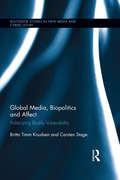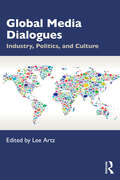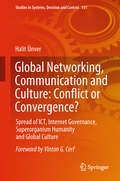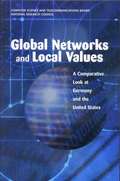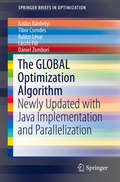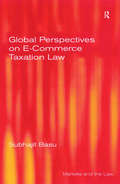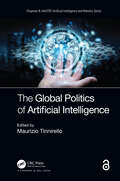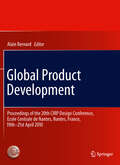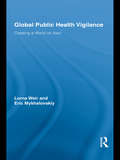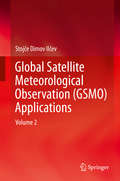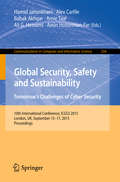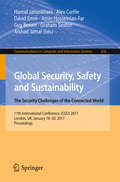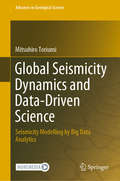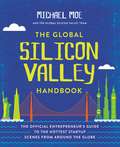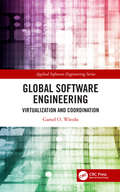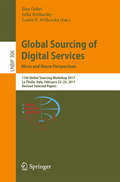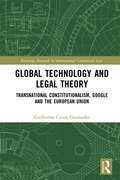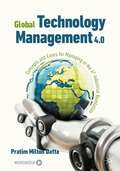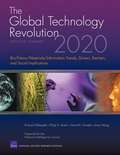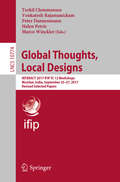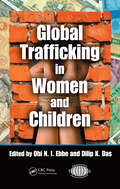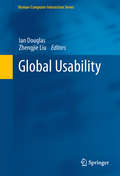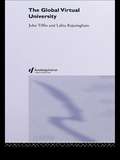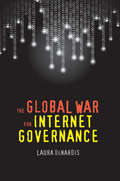- Table View
- List View
Global Media, Biopolitics, and Affect: Politicizing Bodily Vulnerability (Routledge Studies in New Media and Cyberculture)
by Britta Timm Knudsen Carsten StageGlobal Media, Biopolitics and Affect shows how mediations of bodily vulnerability have become a strong political force in contemporary societies. In discussions and struggles concerning war involvement, healthcare issues, charity, democracy movements, contested national pasts, and climate change, performances of bodily vulnerability is increasingly used by citizens to raise awareness, create sympathy, encourage political action, and to circulate information in global media networks. The book thus argues that bodily vulnerability can serve as a catalyst for affectively charging and disseminating particular political events or issues by means of media. To investigate how, when and why that happens, and to evaluate the long-term social impacts of mediating bodily vulnerability, the book offers a theoretical framework for understanding the role of bodily vulnerability in contemporary digital media culture. Likewise, it presents a range of close empirical case studies in the areas of illness blogging, global protests after the killing of Neda Agda Soltan in Iran, charity communication, green media activism, online war commemoration and digital witnessing related to conflicts in Sarajevo and Ukraine.
Global Media Dialogues: Industry, Politics, and Culture
by Lee ArtzThis book, the first of its kind, brings together leading scholars from multiple perspectives in a serious dialogue about continuity and change in global media production and content. Looking at a wide swath of the world, these authors show the emergence of transnational collaboration in global television and film production across national borders that seem to transcend national cultures and identities. At the same time, traditional class analysis of such phenomena is reframed within the rise of myriad social movements for equality, democracy, human rights, and defense of the environment. What are the effects of media, local or global? Does the West continue to dominate or is cultural imperialism waning? With original chapters written by leading scholars from a variety of disciplines, this book will appeal to students and scholars interested in global media communication, cultural studies, and international political economy.
Global Media Dialogues: Industry, Politics, and Culture
by Lee ArtzThis book, the first of its kind, brings together leading scholars from multiple perspectives in a serious dialogue about continuity and change in global media production and content. Looking at a wide swath of the world, these authors show the emergence of transnational collaboration in global television and film production across national borders that seem to transcend national cultures and identities. At the same time, traditional class analysis of such phenomena is reframed within the rise of myriad social movements for equality, democracy, human rights, and defense of the environment. What are the effects of media, local or global? Does the West continue to dominate or is cultural imperialism waning? With original chapters written by leading scholars from a variety of disciplines, this book will appeal to students and scholars interested in global media communication, cultural studies, and international political economy.
Global Networking, Communication and Culture: Conflict or Convergence?
by Halit ÜnverPursuing an interdisciplinary approach, this book offers detailed insights into the empirical relationships between overall social key figures of states and cultures in the fields of information and communication technology (ICT) (digital divide/inequality), the economy, education and religion. Its goal is to bridge the ‘cultural gap’ between computer scientists, engineers, economists, social and political scientists by providing a mutual understanding of the essential challenges posed and opportunities offered by a global information and knowledge society. In a sense, the historically unprecedented technical advances in the field of ICT are shaping humanity at different levels and forming a hybrid (intelligent) human-technology system, a so-called global superorganism. The main innovation is the combined study of digitization and globalization in the context of growing social inequalities, collapse, and sustainable development, and how a convergence towards a kind of global culture could take place. Accordingly, the book discusses the spread of ICT, Internet Governance, the balance between the central concentration of power and the extent of decentralized power distribution, the inclusion or exclusion of people and states in global communication processes, and the capacity for global empathy or culture.
Global Networks and Local Values: A Comparative Look at Germany and the United States
by Committee to Study Global Networks Local ValuesWhether you call it the third wave, the information revolution, or the virtually connected world, the implications of a global information network are profound. As a society, we want to forestall the possible negative impacts without closing the door to the potential benefits. But how?Global Networks and Local Values provides perspective and direction, focusing on the relationship between global information networks and local values-that is, the political, economic, and cultural norms that shape our daily lives. This book is structured around an illuminating comparison between U.S. and German approaches toward global communication and information flow. (The United States and Germany are selected as two industrialized, highly networked countries with significant social differences.)Global Networks and Local Values captures the larger context of technology and culture, explores the political and commercial institutions where the global network functions, and highlights specific issues such as taxation, privacy, free speech, and more. The committee contrasts the technical uniformity that makes global communication possible with the diversity of the communities being served and explores the prospects that problems resulting from technology can be resolved by still more technology. This thoughtful volume will be of interest to everyone concerned about the social implications of the global Internet.
The GLOBAL Optimization Algorithm: Newly Updated With Java Implementation And Parallelization (SpringerBriefs in Optimization)
by Balázs Bánhelyi Tibor Csendes Balázs Lévai László Pál Dániel ZomboriThis book explores the updated version of the GLOBAL algorithm which contains improvements for a local search algorithm and new Java implementations. Efficiency comparisons to earlier versions and on the increased speed achieved by the parallelization, are detailed. Examples are provided for students as well as researchers and practitioners in optimization, operations research, and mathematics to compose their own scripts with ease. A GLOBAL manual is presented in the appendix to assist new users with modules and test functions. GLOBAL is a successful stochastic multistart global optimization algorithm that has passed several computational tests, and is efficient and reliable for small to medium dimensional global optimization problems. The algorithm uses clustering to ensure efficiency and is modular in regard to the two local search methods it starts with, but it can also easily apply other local techniques. The strength of this algorithm lies in its reliability and adaptive algorithm parameters. The GLOBAL algorithm is free to download also in the earlier Fortran, C, and MATLAB implementations.
Global Perspectives on E-Commerce Taxation Law (Markets And The Law Ser.)
by Subhajit BasuIn its most advanced form, e-commerce allows unidentified purchasers to pay obscure vendors in 'electronic cash' for products that are often goods, services and licenses all rolled into one. This book considers the implications for the domestic and international tax systems of the growth of e-commerce. It covers a wide variety of activities, from discussion of the principles governing direct and indirect taxation, to explanation of the implementation and use of e-commerce on the part of businesses as well as the application of existing tax principles in this field. With its focus on the broader issues surrounding the expansion of e-commerce and its attention to the problems arising internationally in this field, Global Perspectives in E-Commerce Taxation Law will appeal to scholars worldwide.
The Global Politics of Artificial Intelligence (Chapman & Hall/CRC Artificial Intelligence and Robotics Series)
by Maurizio TinnirelloTechnologies such as artificial intelligence have led to significant advances in science and medicine, but have also facilitated new forms of repression, policing and surveillance. AI policy has become without doubt a significant issue of global politics. The Global Politics of Artificial Intelligence tackles some of the issues linked to AI development and use, contributing to a better understanding of the global politics of AI. This is an area where enormous work still needs to be done, and the contributors to this volume provide significant input into this field of study, to policy makers, academics, and society at large. Each of the chapters in this volume works as freestanding contribution, and provides an accessible account of a particular issue linked to AI from a political perspective. Contributors to the volume come from many different areas of expertise, and of the world, and range from emergent to established authors.
Global Product Development: Proceedings of the 20th CIRP Design Conference, Ecole Centrale de Nantes, Nantes, France, 19th-21st April 2010
by Alain BernardThis book of proceedings is the synthesis of all the papers, including keynotes presented during the 20th CIRP Design conference. The book is structured with respect to several topics, in fact the main topics that serve at structuring the program. For each of them, high quality papers are provided. The main topic of the conference was Global Product Development. This includes technical, organizational, informational, theoretical, environmental, performance evaluation, knowledge management, and collaborative aspects. Special sessions were related to innovation, in particular extraction of knowledge from patents.
Global Public Health Vigilance: Creating a World on Alert (Routledge Studies in Science, Technology and Society)
by Lorna Weir Eric MykhalovskiyGlobal Public Health Vigilance is the first sociological book to investigate recent changes in how global public health authorities imagine and respond to international threats to human health. This book explores a remarkable period of conceptual innovation during which infectious disease, historically the focus of international disease control, was displaced by "international public health emergencies," a concept that brought new responsibilities to public health authorities, helping to shape a new project of global public health security. Drawing on research conducted at the World Health Organization, this book analyzes the formation of a new social apparatus, global public health vigilance, for detecting, responding to and containing international public health emergencies. Between 1995 and 2005 a new form of global health surveillance was invented, international communicable disease control was securitized, and international health law was fundamentally revised. This timely volume raises critical questions about the institutional effects of the concept of emerging infectious diseases, the role of the news media in global health surveillance, the impact of changes in international health law on public health reasoning and practice, and the reconstitution of the World Health Organization as a power beyond national sovereignty and global governance. It initiates a new research agenda for social science research on public health.
Global Satellite Meteorological Observation (GSMO) Applications: Volume 2
by Stojče Dimov IlčevThis book presents principal structures of space systems functionality of meteorological networks, media and applications for modern remote sensing, transmission systems, meteorological ground and users segments and transferring weather data from satellite to the ground infrastructures and users. The author presents techniques and different modes of satellite image interpretation, type of satellite imagery, spectral imaging properties, and enhancement of imaging technique, geo-location and calibration, atmospheric and surface phenomena. Several satellite meteorological applications are introduced including common satellite remote sensing applications, weather analysis, warnings and prediction, observation and measurements of meteorological variables, atmosphere and surface applications, ocean and coastal applications, land, agriculture and forestry applications, and maritime and aviation satellite weather applications. The author also covers ground segment and user segment in detail. The final chapter looks to the future, covering possible space integrations in meteorological and weather observation.This is a companion book of Global Satellite Meteorological Observation Theory (Springer), which provides the following topics:Evolution of meteorological observations and history satellite meteorologySpace segment with satellite orbits and meteorological payloadsAnalog and digital transmission, type of modulations and broadcasting systemsAtmospheric radiation, satellite meteorological parameters and instrumentsMeteorological antenna systems and propagation
Global Security, Safety and Sustainability: Tomorrow's Challenges of Cyber Security
by Hamid Jahankhani Alex Carlile Babak Akhgar Amie Taal Ali G. Hessami Amin Hosseinian-FarThis book constitutes the refereed proceedings of the 10th International Conference on Global Security, Safety and Sustainability, ICGS3 2015, held in London, UK, in September 2015. The 31 revised full papers presented were carefully reviewed and selected from 57 submissions. The papers focus on the challenges of complexity, rapid pace of change and risk/opportunity issues associated with the 21st century living style, systems and infrastructures.
Global Security, Safety and Sustainability - The Security Challenges of the Connected World
by Hamid Jahankhani Alex Carlile David Emm Amin Hosseinian-Far Guy Brown Graham Sexton Arshad JamalThis book constitutes the refereed proceedings of the 11th International Conference on Global Security, Safety and Sustainability, ICGS3 2017, held in London, UK, in January, 2017. The 32 revised full papers presented were carefully reviewed and selected from 74 submissions. The papers are organized in topical sections on the future of digital forensics; cyber intelligence and operation; information systems security management; systems security, safety, and sustainability; cyber infrastructure protection.
Global Seismicity Dynamics and Data-Driven Science: Seismicity Modelling by Big Data Analytics (Advances in Geological Science)
by Mitsuhiro ToriumiThe recent explosion of global and regional seismicity data in the world requires new methods of investigation of microseismicity and development of their modelling to understand the nature of whole earth mechanics. In this book, the author proposes a powerful tool to reveal the characteristic features of global and regional microseismicity big data accumulated in the databases of the world. The method proposed in this monograph is based on (1) transformation of stored big data to seismicity density data archives, (2) linear transformation of microseismicity density data matrixes to correlated seismicity matrixes by means of the singular value decomposition method, (3) time series analyses of globally and regionally correlated seismicity rates, and (4) the minimal non-linear equations approximation of their correlated seismicity rate dynamics. Minimal non-linear modelling is the manifestation for strongly correlated seismicity time series controlled by Langevin-type stochastic dynamic equations involving deterministic terms and random Gaussian noises. A deterministic term is composed minimally with correlated seismicity rate vectors of a linear term and of a term with a third exponent. Thus, the dynamics of correlated seismicity in the world contains linearly changing stable nodes and rapid transitions between them with transient states. This book contains discussions of future possibilities of stochastic extrapolations of global and regional seismicity in order to reduce earthquake disasters worldwide. The dataset files are available online and can be downloaded at springer.com.
The Global Silicon Valley Handbook
by Michael MoeA fun, yet factual guide to thrive not only in Silicon Valley, but in the emerging Global Silicon Valley.Silicon Valley has become synonymous with big ideas, start-ups, and inventing the future. But today, the magic of Silicon Valley has gone viral and global. From Austin to Boston, from Shanghai to Dubai, a Global Silicon Valley is emerging.In THE GLOBAL SILICON VALLEY HANDBOOK, bestselling author, venture capitalist, and global thought leader, Michael Moe, maps out an insider's guide to Silicon Valley and the hottest emerging markets from around the world. The book highlights need-to-knows, including who the top VCs and angel investors are, phrases to avoid in a pitch, or even where to close a deal over dinner or beers. Visually engaging, THE GLOBAL SILICON VALLEY HANDBOOK aspires to inspire the entrepreneur in all of us.
Global Software Engineering: Virtualization and Coordination (Applied Software Engineering Series)
by Gamel O. WireduTechnology and organizations co-evolve, as is illustrated by the growth of information and communication technology (ICT) and global software engineering (GSE). Technology has enabled the development of innovations in GSE. The literature on GSE has emphasized the role of the organization at the expense of technology. This book explores the role of technology in the evolution of globally distributed software engineering. <P><P>To date, the role of the organization has been examined in coordinating GSE activities because of the prevalence of the logic of rationality (i.e., the efficiency ethos, mechanical methods, and mathematical analysis) and indeterminacy (i.e., the effectiveness ethos, natural methods, and functional analysis). This logic neglects the coordination role of ICT. However, GSE itself is an organizational mode that is technology-begotten, technology-dominated, and technology-driven, as is its coordination. GSE is a direct reflection of ICT innovation, change, and use, yet research into the role technology of GSE has been neglected. <P><P>Global Software Engineering: Virtualization and Coordination considers existing fragmented explanations and perspectives in GSE research, poses new questions about GSE, and proposes a framework based on the logic of virtuality (i.e., creativity ethos, electrical methods, and technological analysis) rather than of rationality and indeterminacy. Virtuality is the primary perspective in this book’s comprehensive study of GSE. The book concludes with an integrated explanation of GSE coordination made possible through ICT connectivity and capitalization.
Global Sourcing of Digital Services: 11th Global Sourcing Workshop 2017, La Thuile, Italy, February 22-25, 2017, Revised Selected Papers (Lecture Notes in Business Information Processing #306)
by Ilan Oshri, Julia Kotlarsky and Leslie P. WillcocksThis book constitutes revised selected papers from the 11th international Global Sourcing Workshop 2017, held in La Thuile, Italy, in February 2017. The 10 contributions included were carefully reviewed and selected from 45 submissions. The book offers a review of the key topics in sourcing of services, populated with practical frameworks that serve as a tool kit to students and managers. The range of topics covered in this book is wide and diverse, offering micro and macro perspectives on successful sourcing of services. Case studies from various organizations, industries and countries are used extensively throughout the book, giving it a unique position within the current literature offering.
Global Technology and Legal Theory: Transnational Constitutionalism, Google and the European Union (Routledge Research in International Commercial Law)
by Guilherme Cintra GuimarãesThe rise and spread of the Internet has accelerated the global flows of money, technology and information that are increasingly perceived as a challenge to the traditional regulatory powers of nation states and the effectiveness of their constitutions. The acceleration of these flows poses new legal and political problems to their regulation and control, as shown by recent conflicts between Google and the European Union (EU). <P><P> This book investigates the transnational constitutional dimension of recent conflicts between Google and the EU in the areas of competition, taxation and human rights. More than a simple case study, it explores how the new conflicts originating from the worldwide expansion of the Internet economy are being dealt with by the institutional mechanisms available at the European level. The analysis of these conflicts exposes the tensions and contradictions between, on the one hand, legal and political systems that are limited by territory, and, on the other hand, the inherently global functioning of the Internet. The EU’s promising initiatives to extend the protection of privacy in cyberspace set the stage for a broader dialogue on constitutional problems related to the enforcement of fundamental rights and the legitimate exercise of power that are common to different legal orders of world society. Nevertheless, the different ways of dealing with the competition and fiscal aspects of the conflicts with Google also indicate the same limits that are generally attributed to the very project of European integration, showing that the constitutionalization of the economy tends to outpace the constitutionalization of politics. <P><P> Providing a detailed account of the unfolding of these conflicts, and their wider consequences to the future of the Internet, this book will appeal to scholars working in EU law, international law and constitutional law, as well as those in the fields of political science and sociology.
Global Technology Management 4.0: Concepts and Cases for Managing in the 4th Industrial Revolution
by Pratim Milton DattaTechnology is pervasive in today’s globalized world. Moreover, technology and globalization drive competitiveness and strategy, and must be managed well. This textbook uses technology management as the central theme to cover multiple business and social facets, including digital transformation, cybersecurity, international operations, marketing, finance, culture, human capital, and the political economy. The book is divided into four sections. Part 1 examines the confluence of globalization and technology from the first Industrial Revolution to the current Fourth Industrial Revolution. Part 2 introduces strategic and analytical metrics and models that are crucial to managerial decision-making. Part 3 discusses the basics of cybersecurity and combating cyber-threats to protect organization and its stakeholders. Part 4 focuses on sustainable operations, global projects, and digital transformation in a technology-centric, globalized world. The book will help students learn how to navigate business aspects of globalization and technology in the 4th Industrial Revolution (4IR). For instructors, the learning objectives and discussion questions help guide students in grasping the material.
The Global Technology Revolution 2020, Executive Summary
by Philip S. Anton Richard Silberglitt Anny Wong David R. HowellIn 2020, areas of particular importance for technology trends will include biotechnology, nanotechnology, materials technology, and information technology. The authors of this report assessed a sample of 29 countries across the spectrum of scientific advancement (low to high) with respect to their ability to acquire and implement 16 key technology applications (e.g., cheap solar energy, rural wireless communications, genetically modified crops).
Global Thoughts, Local Designs: Ifip Tc 13 Workshops At Interact 2017, Mumbai, India, September 25-27, 2017, Revised Selected Paperrs (Theoretical Computer Science and General Issues #10774)
by Marco Winckler Helen Petrie Peter Dannenmann Venkatesh Rajamanickam Torkil ClemmensenThis book contains revised selected papers presented at 4 workshops held at the 16th IFIP TC 13 International Conference on Human-Computer Interaction, INTERACT 2017, in Mumbai, India, in September 2017. The workshops are: Workshop on Dealing with Conflicting User Interface Properties in User-Centered Development Processes (IFIP WG 13.2 and 13.5), Workshop on Cross Cultural Differences in Designing for Accessibility and Universal Design Organizers (IFIP WG 13.3), Human Work Interaction Design Meets International Development (IFIP WG 13.6), and Beyond Computers: Wearables, Humans, and Things - WHAT! (IFIP WG 13.7).The 15 full papers included in this volume were carefully reviewed and selected from numerous submissions. They show advances in the field of HCI dealing with topics such as human-centered computing, user interface design, evolutionary user interface prototyping, end-user development systems, accessibility design, human work interaction design, and wearables.
Global Trafficking in Women and Children (International Police Executive Symposium Co-Publications)
by Obi N. I. Ebbe Dilip K. DasWar, poverty, and famine; political, social, and economic change; and the deep seated views and rituals rooted in a culture‘s history and traditions all contribute to the widespread and growing trafficking of women and children. The multilayered complexity, myriad contributing factors, enormous amount of money involved, and sheer magnitude of the
Global Usability
by Ian Douglas Zhengjie LiuThe concept of usability has become an increasingly important consideration in the design of all kinds of technology. As more products are aimed at global markets and developed through internationally distributed teams, usability design needs to be addressed in global terms. Interest in usability as a design issue and specialist area of research and education has developed steadily in North America and Europe since the 1980's. However, it is only over the last ten years that it has emerged as a global concern. Global Usability provides an introduction to the important issues in globalizing design and an insight into the development of usability expertise around the world. The book is divided into two sections. The first section deals with the general issues in cross-cultural design and the methods for conducting usability design and evaluation across geographical boundaries. The second section describes the state of usability development in fifteen countries. The descriptions include a history and review of activities and include some unique perspectives that have developed in relation to usability work. Researchers and practitioners from a variety of design-related disciplines will find the book a useful guide for understanding the issues and an excellent reference source for working in any of the countries covered.
The Global Virtual University
by Lalita Rajasingham John TiffinThis book is about the shift from the modern university of the nation state to the global virtual university of the future. John Tiffin and Lalita Rajasingham launched the idea of virtual universities on the Internet with the publication of 'In Search of the Virtual Class: Education in an Information Society' in 1995. Since then, virtual universities have multiplied worldwide. However, the authors argue that globalisation and the Internet are still in their infancy, and universities have yet to face the challenges of global free trade in broadband telecommunications, artificial intelligence and HyperReality.Based on material gathered from research in the USA, Japan, Taiwan, Brazil, Malaysia, Australia and New Zealand, this book describes how a global university could function in the future and presents a paradigm from which it might be constructed.This unique, visionary text will be critical reading for academics, postgraduate students and for anyone involve din policymaking and planning within the university community and administration.
The Global War for Internet Governance
by Laura DenardisThe Internet has transformed the manner in which information is exchanged and business is conducted, arguably more than any other communication development in the past century. Despite its wide reach and powerful global influence, it is a medium uncontrolled by any one centralized system, organization, or governing body, a reality that has given rise to all manner of free-speech issues and cybersecurity concerns. The conflicts surrounding Internet governance are the new spaces where political and economic power is unfolding in the twenty-first century. This all-important study by Laura DeNardis reveals the inner power structure already in place within the architectures and institutions of Internet governance. It provides a theoretical framework for Internet governance that takes into account the privatization of global power as well as the role of sovereign nations and international treaties. In addition, DeNardis explores what is at stake in open global controversies and stresses the responsibility of the public to actively engage in these debates, because Internet governance will ultimately determine Internet freedom.
